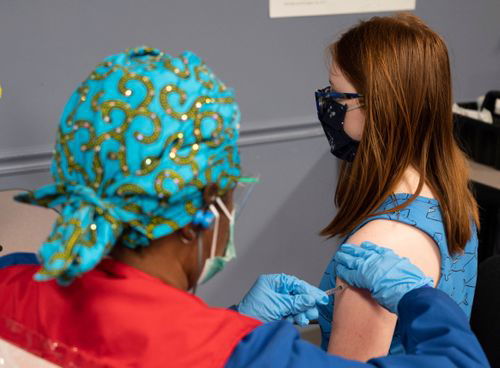Covid-19 vaccine isn’t linked to heart problems in young people — but doctors still worry parents will be scared to vaccinate their children

Pediatricians worry parents will misinterpret a finding by advisers to the US Centers for Disease Control and Prevention and become scared — for no reason — to vaccinate their children against Covid-19.
Last week, members of the CDC’s Advisory Committee on Immunization Practices put out a statement that they had investigated reports of a heart ailment among people — predominantly teens and young adults — who had received a Covid-19 vaccine.
The panel concluded that the rates of myocarditis — inflammation of the heart muscle — were not higher among people who had been vaccinated.
“Careful investigation indicates [myocarditis] did not occur more frequently among young people who were vaccinated than among young people who were not vaccinated,” said Dr. William Schaffner, an ACIP member. “So there is no causal link to the vaccination.”
“You’re as likely to get myocarditis if you were vaccinated than if you weren’t vaccinated,” added Dr. Paul Offit, a pediatric infectious disease specialist at the University of Pennsylvania. “There’s every reason to think this isn’t a problem. There’s every reason to think this is nothing parents should be worried about.”
But pediatric infectious disease experts are concerned parents will misunderstand the data.
“This makes me worry that people will be unnecessarily frightened about these vaccines,” said Offit, a member of the Vaccines and Related Biological Products Advisory Committee to the US Food and Drug Administration.
That concern arose last week in a call among ACIP members, according to Schaffner, who was on the call.
“There was concern this would be misunderstood — that people would think myocarditis was associated with vaccine,” he said. “A colleague who was on the call said ‘This could put the kibosh on teenage vaccination.’ “
Investigating reports of adverse events after vaccination
For all vaccines — not just the ones that protect against Covid-19 — the CDC and the FDA encourage people to report an “adverse event” that happens after vaccination.
“Doctors and patients are encouraged to report medical events that happen after vaccination, if there is even a thought or hypothesis or a question whether it may be related to the vaccine,” said Schaffner, an infectious disease specialist at Vanderbilt University Medical Center.
After reports are made to the Vaccine Adverse Event Reporting System, the CDC and FDA then look to see whether the rate of an adverse event — in this case, myocarditis – is higher than expected.
“If these events occur more frequently in the vaccinated population than the unvaccinated population, then there’s reason to think it might be because the vaccine may have caused it. But if the incidents occurred similarly in the vaccinated and the unvaccinated population, then it is overwhelmingly likely they were just coincidental and would have occurred anyways,” Schaffner said.
In its statement on the CDC’s website, ACIP said there were “relatively few reports of myocarditis to date” and that “most cases appear to be mild,” but did not give specific case numbers.
The statement concluded that “within CDC safety monitoring systems, rates of myocarditis reports in the window following COVID-19 vaccination have not differed from expected baseline rates,” adding that “follow-up of cases is ongoing.”
In a statement to CNN Monday night, the CDC said that the reports of myocarditis are “rare given the number of vaccine doses administered.” About 164 million people in the United States have received at least one dose of vaccine, and more than 5 million people ages 12 to 17 have received their first dose.
The statement said the CDC and the FDA would continue to “monitor and evaluate reports” of myocarditis and pericarditis, which is swelling of the tissue around the heart.
The agency encouraged health care providers to report cases of myocarditis following vaccination to VAERS.
“CDC continues to strongly recommend COVID-19 vaccination for individuals 12 years of age or older given the risk of COVID-19 illness and related, potentially severe, complications. Getting vaccinated is the best way to protect you and your family from COVID-19,” according to the statement.
‘My kids would be at the front of the line’
Myocarditis is often caused by infections, and rates are particularly high this time of year, when the coxsackie virus, which can infect the heart, is more common, Offit said.
Based on the approximately 164 million people who have received at least one dose of the vaccine and the rates of myocarditis in the US, you would expect to see hundreds of cases myocarditis every month among those who have been vaccinated, he said, emphasizing that those cases are not because of the vaccine, but coincidental.
An infectious disease expert with the American Academy of Pediatrics said the group will continue to follow the CDC’s analysis of myocarditis cases after vaccination.
Dr. Yvonne Maldonado, chair of the American Academy of Pediatrics’ Committee on Infectious Diseases, said parents should be confident that the CDC and FDA safety systems are catching any potential vaccine side effects.
“What the CDC and the FDA are trying to do is to make sure they keep track of everything that is reported to them and see if it could or could not be related to the vaccines,” she said. “That’s why I think our safety system in the US is really great.”
Maldonado said while the federal agencies continue to do their surveillance, young people ages 12 and up should get vaccinated against Covid-19.
“My kids would be at the front of the line,” she said.